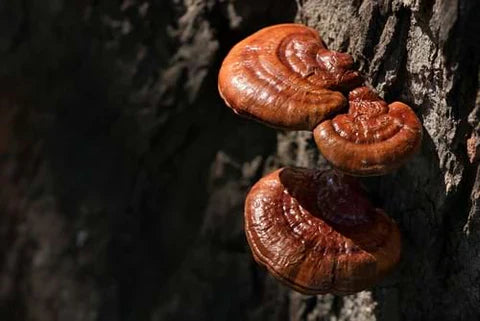Lingzhi, also known as Ganoderma lucidum, is no ordinary mushroom. It is a revered species deeply woven into the tapestry of traditional Chinese medicine and other Asian cultures. With its glossy, reddish-brown cap, often resembling a fan or a kidney, this extraordinary mushroom has earned various sobriquets such as "the mushroom of immortality" or "the herb of spiritual potency" in Chinese culture. While Lingzhi is renowned for its potential health benefits, it carries a rich history that extends beyond mere medicinal properties, and its cultural significance is a testament to its enduring allure.
A Natural Marvel

Lingzhi is characterized by its unique appearance, with a cap that glistens in the sunlight. This mushroom, which belongs to the Ganodermataceae family, thrives on hardwood trees and is native to Asia. While it was historically confined to its natural habitat, the growing recognition of its medicinal properties has led to its cultivation in various parts of the world.
A Journey Through Time
The history of Lingzhi dates back thousands of years, making it one of the oldest known mushrooms used in traditional medicine. Chinese legends often intertwine with Lingzhi, where it is said to be a symbol of longevity, spiritual awakening, and immortality. In fact, its name, "Lingzhi," is derived from two Chinese words - "ling," meaning "spirit," and "zhi," meaning "plant" or "mushroom."
The mushroom's rich historical roots are also mirrored in other Asian cultures. In Japan, it is known as "Reishi," and in Korean, it goes by "Yeongji" or "Mannamtake." Each of these names encapsulates the mushroom's cultural and historical significance.
Cultural Significance
Beyond its reputation for potential health benefits, Lingzhi has taken on a special place in Asian cultures. In Chinese mythology and art, it is often associated with longevity and immortality. This mushroom appears in paintings, sculptures, and various art forms, signifying the pursuit of a long and fulfilling life.
Furthermore, Lingzhi is often depicted in the hands of deities and immortals in traditional Chinese artwork, emphasizing its spiritual and life-extending properties. Its role in these depictions serves as a symbol of divine protection and prosperity.
Modern Reverence
While Lingzhi's cultural importance has been preserved throughout the ages, modern science has cast a spotlight on its potential health-promoting properties. Numerous studies have explored its potential benefits, revealing that it contains a variety of bioactive compounds, including polysaccharides, triterpenes, and antioxidants. These compounds are thought to have potential immunomodulatory, anti-inflammatory, and antioxidant effects.

It's essential to remember that while Lingzhi has shown promise in scientific research, its use should be approached with caution, especially in conjunction with other medications or health conditions. Consulting with a healthcare professional is recommended before integrating Lingzhi into one's wellness regimen.
Lingzhi, or Ganoderma lucidum, is not just a mushroom; it is a living symbol of ancient wisdom, cultural significance, and potential health benefits. Its history as "the mushroom of immortality" in Chinese culture has stood the test of time, and its influence has transcended borders to impact other Asian societies.
As we continue to unlock the mysteries of this mystical mushroom through scientific research, it is essential to remember that Lingzhi is not just about health benefits and cooking; it is a bridge connecting the past, present, and future, uniting us with our ancestral knowledge and the ever-expanding horizons of scientific discovery. Whether revered as a symbol of longevity or embraced for its potential wellness effects, Lingzhi remains a source of inspiration and wonder, reminding us that the mysteries of nature are vast and enduring.
Related Content:
Available In-Store





Why Buy Lingzhi from Yue Hwa?
Since 1959, Yue Hwa has been a reputable provider of premium Chinese products, ensuring that every purchase you make is genuine.

